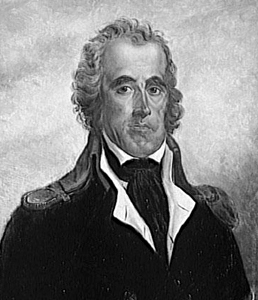General Jean Nicolas Houchard

Born: January 24, 1738
Place of Birth: Forbach, Moselle, France
Died: November 17, 1793
Cause of Death: Executed
Place of Death: Paris, France
Arc de Triomphe: HOUCHARD on the north pillar
Pronunciation:
The son of a lawyer, Jean Nicolas Houchard first enlisted in 1755 in a cavalry regiment. He served during the Seven Years War and in 1759 he was wounded at the Battle of Minden. In 1763 Houchard was commissioned as a sous-lieutenant and then in 1768 he began serving in Corsica where he would remain until some time in 1770. During his time in Corsica he was wounded when his jaw was shattered in combat. In 1770 he was promoted to lieutenant, in 1779 he was promoted to capitaine, and in 1781 he was named a Knight of Saint Louis. By the time of the French Revolution, Houchard had only risen to the rank of capitaine, but he was perfectly happy with that.1 In October of 1791 he became General Custine's aide-de-camp and soon he would unable to refuse the commands assigned to him. Serving with the Army of the Rhine, Houchard was promoted to colonel in August of 1792 and given command of the 2nd Chasseurs à Cheval. Fighting that year, he commanded the advance guard at Spire and Frankfurt, seized the redoubts of Nauheim, and defeated the Prussians at Limburg. A promotion to maréchal de camp followed in December of 1792.
Now a general, in 1793 Houchard tried to defend Hochheim and he served in the rear guard at the combat of Ober-Florsheim. That March he was promoted to général de division and then a month later Custine named him commander of the Army of the Moselle. In May Houchard was also given command of the Army of the Rhine, and then in August he was named commander of the Army of the North when Custine was recalled to Paris to eventually meet the guillotine. On the very first day he took command of the Army of the North, Houchard learned that a representative of the people had arrested his entire staff and sent all the headquarters records to Paris.2
Leading the Army of the North, Houchard defeated the Austrians at the Battle of Hondschoote but was uneasy about a vigorous pursuit. He seized Menin but after a small check he decided to retreat and before long this retreat degenerated into a rout. Houchard was immediately relieved of command and arrested, then transported to Paris and imprisoned at l'Abbaye. He was taken before a revolutionary tribunal and condemned to die, and he was executed by guillotine on November 17th, 1793.
Notes
- John R. Elting, Swords Around a Throne: Napoleon's Grande Armée, (USA: Da Capo Press, 1997), 37.
- Ibid., 37.
Bibliography
- Divry, Arnauld. Les Noms Gravés sur l'Arc de Triomphe. Paris: L'Harmattan, 2017.
- Six, Georges. Dictionnaire Biographique des Généraux & Amiraux Français de la Révolution et de l'Empire (1792-1814). 2 vols. Paris: Gaston Saffroy, 2003.
Updated April 2025
© Nathan D. Jensen